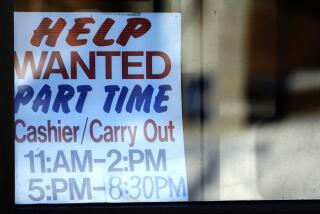Job satisfaction keeps sliding, survey finds
- Share via
If you’re lucky enough to have a job in this economy, chances are that you dislike it.
Just 45% of employees are happy in their positions, the lowest level in 22 years, according to a survey released Tuesday by the Conference Board. In 1987, when the New York nonprofit group first began collecting the data, more than 61% said they were satisfied.
The recession, and the extra work that many employees who survived layoffs have been saddled with, play a role in the decline -- but not as much as some might think. Job satisfaction has been sliding for years across all age and income brackets, said Lynn Franco, director of the organization’s Consumer Research Center.
“Irrespective of boom or bust, the trend has been pretty negative over time,” she said. “We’ve seen a significant erosion, and just about every facet of working life is a factor.”
A June report from the Society for Human Resource Management found that the current economy has had no effect on job satisfaction for 58% of employees.
The sense of malaise extends to workers young and old, according to the Conference Board. Employees under age 25 were the least satisfied. Compared with the 55.7% who reported being pleased with their jobs in 1987, just 35.7% of young workers agreed in 2009, the lowest percentage ever recorded in that bracket.
As fresh recruits into the workforce, younger employees might have unrealistic expectations for a fast-paced environment, experts said.
“What happens is that about two weeks after they start, they discover they’re working with a bunch of dweebs shooting toward mediocrity and their sights are lowered. And then 18 years go by,” said Roxanne Emmerich, whose Minneapolis consultancy focuses on improving workplace environments. “And now, you add on the recession and layoffs and an atrocious workload.”
In 1987, most age groups had a satisfaction rate hovering around 60%, with the exception of the 70.8% of workers 65 and older who were happy with their jobs. But in 2009, just 43.4% of those employees were feeling fulfilled in their positions, the same percentage as workers ages 35 to 44.
The survey of 5,000 U.S. households turned up wide-ranging complaints, from wages and vacation policies to the nature of their positions and the quality of their bosses, Franco said.
Many employees were also pessimistic about their chances for a long future in their jobs -- more than 1 in 5 see themselves out of their current positions within the year. The number of those who claimed to have job security fell 17.5 percentage points.
Employees’ interest in their duties decreased 18.9 percentage points, Franco said. Resentment is growing as employers shift costs from the business onto the workers. Employee behavior and retention could suffer as a result.
“As these levels of dissatisfaction grow, there are negative implications for productivity that can also impact the company’s bottom line,” she said. “We need to constantly take the pulse of employees, but there’s no quick fix.”
With the huge amount of upheaval at many workplaces, Franco said, it may be difficult for employers to make the companywide changes necessary to make employees happier.
Indeed, Emmerich said, many workplaces resemble adult day care, with whining and gossip preventing employees from enjoying work.
Other studies have suggested that employers overestimate the satisfaction of their staff. A February report from Salary.com Inc. found that managers assumed that 77% of employees were somewhat satisfied, when the actual figure was 65%. Similarly, 65% of workers said they had looked for new jobs, while employers estimated that 37% of their staff members were job hunting.
To build trust, bosses should aim for good communication with staffers, while keeping them challenged and engaged, experts said.
“Employers have to get better at eliminating the energy vampires that are sucking everyone dry and understand that what makes work fun for people is being highly productive and successful,” Emmerich said. “And that’s a lost art for a lot of companies -- showing employees how to win.”
Times staff writer Walter Hamilton contributed to this report.
More to Read
Inside the business of entertainment
The Wide Shot brings you news, analysis and insights on everything from streaming wars to production — and what it all means for the future.
You may occasionally receive promotional content from the Los Angeles Times.











